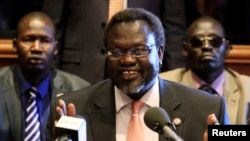Former South Sudan vice president turned rebel leader Riek Machar said Tuesday he is firmly committed to restoring peace in South Sudan, despite running into some difficulties during the IGAD-led negotiating process.
"Our desire is to have peace... and that’s why we accepted the mediation of IGAD, the regional body, and we have been engaged since January 1st, 2014, in this forum seeking peace," Machar told South Sudan in Focus in an interview.
Machar, whom President Salva Kiir has accused of masterminding a failed coup against him that started months of violence in South Sudan, said on the first day of 2014 that he had sent a delegation to Ethiopia for peace talks led by the Intergovernmental Authority on Development (IGAD). The peace talks got off to a shaky start several days later, and at the end of January, the two sides signed a cessation of hostilities agreement. In spite of that agreement, fighting has continued to rake South Sudan, pushing the already struggling young country to the edge of famine, stalling development, and claiming thousands of lives.
IGAD interference
Machar said that one of the difficulties faced by negotiators at the talks was interference by IGAD leaders in the peace process.
"At times, there is confusion... particularly on the 24th and 25th of August when the IGAD heads of state and government signed a protocol which was not agreed by the two warring parties," he said, referring to a "matrix" for ending the conflict that was signed at an extraordinary meeting of IGAD heads of state and government in Addis Ababa.
IGAD trumpeted the signing of the matrix, but Machar's opposition movement denied within hours that they had agreed to it.
The IGAD-led peace talks have continued to inch forward slowly since then, but with little evidence that they are helping to restore peace in South Sudan.
'You know who is on offensive'
Machar spoke to South Sudan in Focus days after fresh fighting flared in two of two of the hot-spots in the conflict, Bentiu in Unity state and the area of Dolieb near Malakal in Upper Nile state. The government, IGAD and the United States blamed Machar's opposition fighters for starting the fighting in Bentiu, and the government said Machar's fighters attacked SPLA positions near Malakal.
But Machar disputed the claims. "You know who is on the offensive... We know that the government has been planning to resolve this matter through military means, but they’re using the resources which would be used for the support of development and humanitarian issues," he said.
"This is not a government that wants peace," he said.










